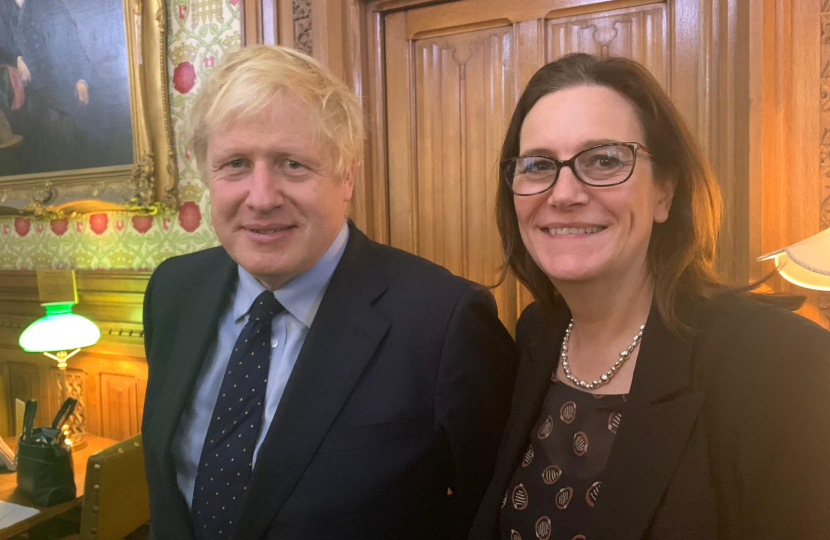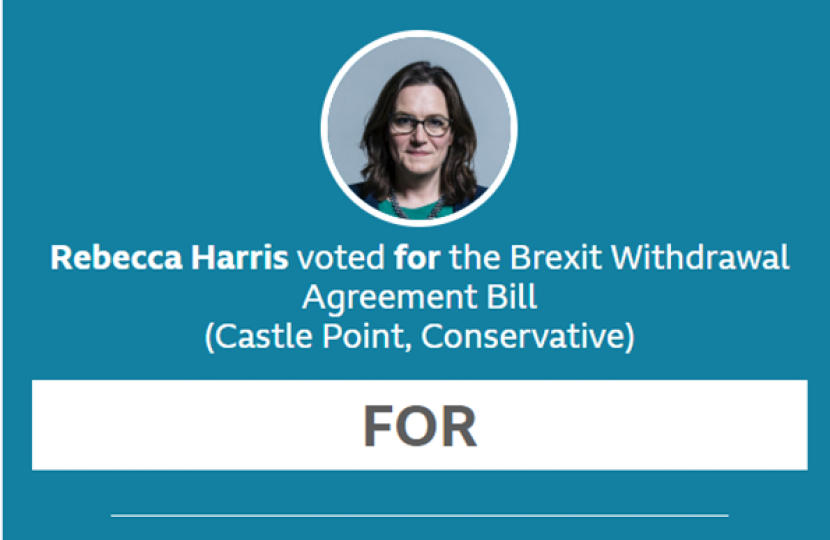I voted to leave the European Union and was delighted that turnout at the EU referendum was larger than at any national election since 1992. For the first time in my life I had the chance to campaign on the UK's withdrawal to leave the EU and take back control of our sovereignty.
My reason for wanting to leave the EU was simple, I believe that the laws which govern our lives, the decisions which affect each and every one of us and the taxes that we must all pay should be decided here in this country, not in Brussels. Wanting to leave the institution of the EU does not mean being anti-Europe. By leaving the EU, we can reclaim so many of the things we have lost while strengthening our links to the rest of the world. One of the messages that I heard on the doorstep during the referendum campaign was clear; the UK must regain its sovereignty.
January 2024 - 4th Brexit Anniversary Update
Since the 2016 EU referendum, the UK has grown faster than Germany, Italy, and Japan and at a similar rate to France. Our services exports are at a record-high of £472 billion and the IMF predicts that between 2024-2028 the UK will see the 3rd fastest growth in the G7 stronger than France, Germany, Italy and Japan.
Since the UK’s departure from the EU, this Government has cut burdensome red tape for business. We’ve built dozens of trading relationships with new friends and old allies. And we’ve taken back control of our laws, borders, and tariffs. This newfound agility was crucial in helping us get through the pandemic with the fastest vaccine rollout in Europe – which in turn allowed us to re-open our economy even sooner. The UK is capitalising on its hard-won freedoms, but the Government is also ensuring Brexit delivers real tangible benefits for the British people too. We are using our Brexit dividend to grow our economy and plough more money into our public services, including our brilliant NHS – set to be in receipt of £1 billion more per week than in 2017.
REMOVING EU REGULATIONS
We ensured that for the first time in a generation, the principle of EU law being supreme has been removed from our statute book.
- The Retained EU Law (Revocation and Reform) Act provides powers for the swift removal and reform of retained EU law and we have already revoked or reformed over 2,000 pieces of them. A further 500 revocations and reforms are planned in 2024 and the Government’s roadmap will see the reform or revocation of around 3,500 pieces of EU law, over half of the original stock inherited from the EU.
- The EU have introduced thousands of new laws on EU Member States since the transition period ended – many of which would have previously applied to the UK. Within the EU, the UK would not have been able to cut VAT on the installations of solar panels, heat pumps and insulation to zero.
- Replacing the top-down impositions of the EU’s Common Fisheries Policy - As an independent coastal state we are using our freedoms to provide a new approach, new investment and a new Brexit quota uplift creating new fishing opportunities for the UK. Reforming employment law, saving industry up to £1 billion per year.
- Under Working Time Regulations, we are simplifying annual leave and holiday pay calculations and reducing recordkeeping requirements, saving industry up to £1 billion a year by 2026.
REMOVING MARKET BARRIERS
As an independent trading nation, since the start of 2020, the UK has resolved around 500 barriers blocking British businesses from exporting abroad. Breaking down these barriers helps UK companies to sell their goods and services all around the world.
- In 2022, the UK committed to resolving 100 priority barriers and unlocking new opportunities worth around £20 billion to British businesses. In 2023, this was equivalent to removing around £1 million of trade barriers every single hour.
- The Department for Business and Trade has been leading work to tackle the 100 highest priority trade barriers which are blocking UK businesses from selling their goods and services around the world.
BOOSTING INTERNATIONAL TRADE
Due to Brexit, the UK now has more trade agreements in effect than any other sovereign, independent country in the world. Free trade is a core part of the government’s plan to boost economic growth. We have secured trade agreements with 73 countries plus our comprehensive deal with the EU. These countries accounted for £1.1 trillion of UK bilateral trade in 2022.
- We have joined the Comprehensive and Progressive Agreement for Trans-Pacific Partnership, bringing new opportunities for UK businesses with 99% of current UK goods exports eligible for zero tariffs in dynamic economies across Asia-Pacific.
- In June 2023, the Prime Minister and President Biden announced the Atlantic Declaration, a first-of-its-kind economic partnership.
- The UK has signed Memoranda of Understanding with eight US states – Indiana, North Carolina, South Carolina, Oklahoma, Utah, Washington, Texas and Florida.
- In May 2020, the UK set our own tariff regime via the UK Global Tariff. Tailored to the needs of the UK economy, we have liberalised around 2000 lines, including nuisance tariffs. The Government also streamlined and simplified thousands of tariff lines, lowering costs for businesses. For the UK, a little under 50% of products are now tariff free compared to 27% in the EU’s tariff schedule.
ADVANCED MANUFACTURING
A thriving manufacturing sector. The UK is the 8th largest manufacturer in the world and had the fastest manufacturing productivity growth in the G7 between 2010 and 2021.
- The Advanced Manufacturing Plan - Underpinned by a £4.5bn commitment for strategic manufacturing sectors to 2030, SME digital adoption through Made Smarter, tax relief, business environment measures and measures to ensure the resilience of the sector’s supply chain including the publication of a UK Battery Strategy.
- At the Autumn Statement, the UK announced a permanent 100% allowance for plant and machinery, making the UK the most competitive major advance economy for manufacturing investment.
February 2023:
The Northern Ireland Protocol within the Brexit deal upset the delicate balance of the Good Friday Agreement and caused the power-sharing institutions to collapse. I therefore welcome the news that the Government is acting to rebalance the Protocol, restore the consent of all communities, and chart a new way forward for Northern Ireland through the new Windsor Framework.
You can find full details here: www.rebeccaharris.org/news/rebecca-harris-mp-welcomes-windsor-framework
30th December 2020:
I am pleased that the commitments made to the people of Castle Point and the British public during the 2016 referendum and in the General Election last year have now been delivered. We have taken back control of our money, borders, laws, trade and waters.
As promised by the Government, this deal takes back control of our laws, borders, money, trade and fisheries – and it ends any role for the European Court. From 1st January 2021, the United Kingdom will have political and economic independence – and we will thrive as a country now fully outside the European Union.
The deal the Government has secured is the first FTA the EU has ever reached based on zero tariffs and zero quotas, and is great news for families and businesses in Castle Point and every part of the UK. 2021 will be our opportunity to show what Global Britain means to the rest of the world: striking trade deals with new markets, reasserting ourselves as a liberal and free trading nation; and acting as a force for good in the world.
You can find the details in full here: www.rebeccaharris.org/brexit-deal


